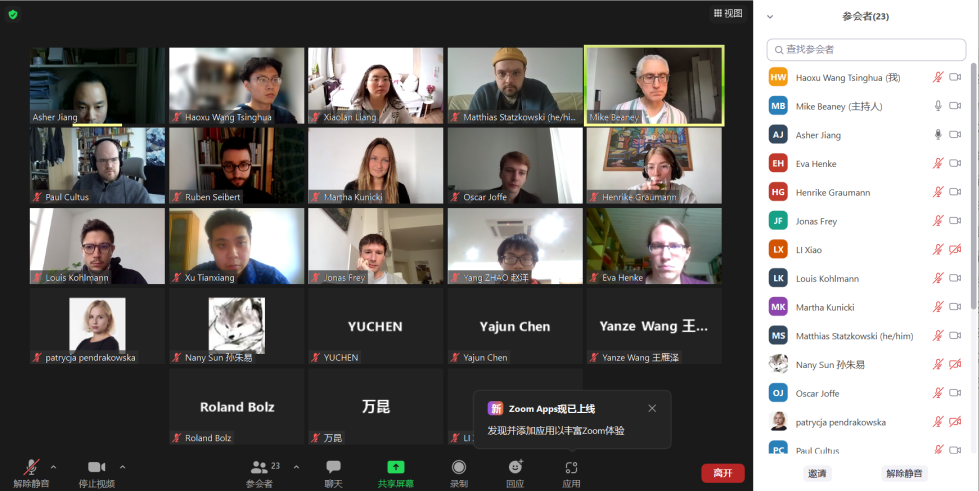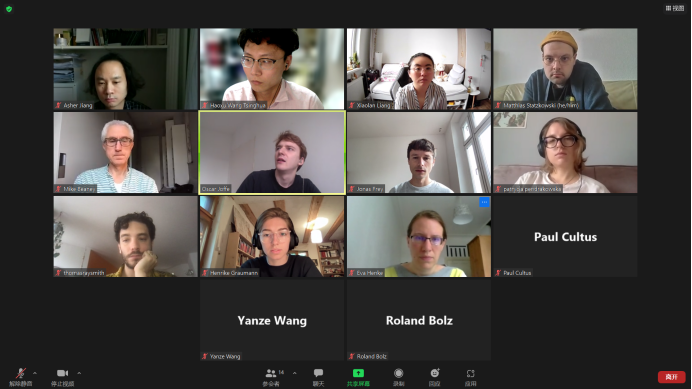2022年5月14、21、28日,三场澳门沙金在线平台-柏林洪堡大学哲学系Joint Colloquium在线上顺利举行。在三场报告中,讨论热烈,效果良好,特此回顾。以下是三场报告的概要和现场截图。
Asher Jiang 清华
2022/5/14
Reconsidering Carnap’s Framework-Pluralism
Abstract: I think Carnap holds linguistic pluralism concerning the number of objects (even though he has never explicitly articulated this doctrine): Variant counts of objects turn out to be correct in different linguistic frameworks and all these frameworks are tolerable. I reconstruct Carnap’s pluralistic doctrine and argue that it leads to a particular kind of metaontological deflationism regarding the number of objects. This kind of deflationism is attractive. For it is free of some crucial shortcomings exhibited by neo-Carnapian positions which are deflationist regarding the same issue.

Michael Beaney and Xiaolan Liang
Humboldt University
2022/5/21
Zhang Shizhao and the Translation of ‘Logic’ into Chinese
Introduction: In 1910 Zhang Shizhao (章士釗, 1881–1973) published an influential essay ‘On the Meanings of Names in Translation’ (Lùn fānyì míngyì 論翻譯名義). His main example was ‘logic’, which he proposed to translate as ‘luójí’ (邏輯) or ‘luójíxué’ (邏輯學). Zhang rejected the three most popular renderings at the time—‘míngxué’ (名學), ‘biànxué’ (辯學), and ‘lùnlǐxué’ (論理學)—on the grounds that while each reflected some uses of ‘logic’ in the European tradition, none managed to do justice to all of them and hence were misleading. Each of these alternatives translated ‘logic’ through a semantic definition, but this was a bad policy to adopt, he argued, as it meant that new translations would be required every time the definition changed. He advocated ‘luójí(xué)’ precisely because it did not presuppose a particular definition. As a phonemic loan, it was semantically neutral.
Zhang’s essay generated much criticism, to which Zhang responded in subsequent writings, but—unlike in the case of many other philosophical terms—his proposed renderingof ‘logic’ eventually established itself as the standard translation. The arguments he offered raise important issues in the philosophy of translation, and highlight just what a complex activity it is to translate philosophical terms into Chinese, of which the vast majority of philosophers who speak only European languages have no conception. It is Zhang’s essay and the issues it raises that we discuss in the present paper. In the first part we sketch some of the relevant historical and philosophical background, and in the second part we examine and evaluate Zhang’s arguments in detail, drawing out their philosophical significance.

Oscar Humboldt University
2022/5/28
Elucidation and Ostension in Frege and the earlyWittgenstein
Introduction (节选): Wittgenstein writes at §3.263 of the Tractatus that “[t]he meanings of primitivesigns can be explained by elucidations. Elucidations are propositions that containthe primitive signs. They can therefore only be understood if the meanings ofthese signs are already known.” My main aim in this essay is to argue for thenegative claim that, contra Hacker (1975, 1982), the elucidation mentioned hereshould not be understood in terms of ostension. Understanding the elucidatoryconnection of names with objects at work in §3.263 in terms of ostension rendersmysterious Wittgenstein’s claim at §3.02 that “what is thinkable is also possible.”It is, of course, part and parcel of Hacker’s reading of the Tractatus that theview of language it presents is flawed, and that Wittgenstein’s later work isshaped by his understanding of the shortcomings of the early work. It istherefore no objection to Hacker’s reading of the Tractatus that it ascribes anincoherent view to it. But I will try to show that the problem incurred by reading§3.263’s elucidation as a form of ostension is strongly reminiscent of a problemWittgenstein raised a few years earlier for Russell’s multiple relation theory ofjudgement. We therefore have good reason, I argue, to think it improbablethat Wittgenstein himself thought of the elucidation of Tractarian names in theostension-based way Hacker suggests.


